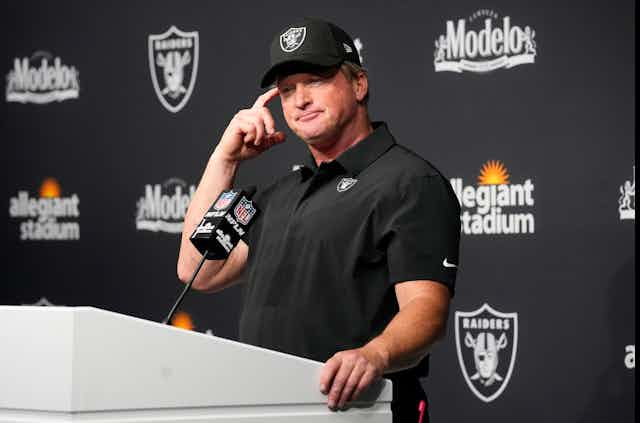Last weekend, the NFL (the world’s most profitable sports league) found itself in an all-too-familiar controversy after a now-former head coach’s disparaging emails containing racist, misogynistic, homophobic and transphobic content were brought to light by a third-party investigation.
After the first emails were released last week, the former head coach in question, Jon Gruden of the Las Vegas Raiders, stood in front of reporters and said: “I don’t have an ounce of racism in me. I’m a guy that takes pride in leading people together. And I’ll continue to do that for the rest of my life.”
The type of leadership Gruden referenced in his mad dash to damage control is everywhere, from the league’s ownership groups to its front offices and coaching staff. It demands the protection of men like Gruden while ostracizing anyone who dares challenge the dominant system of power (like Colin Kaepernick). Its existence has resulted in what some have described as a culture of rot throughout the league.
What’s fascinating and perhaps unique about the coverage, response and fallout of the league’s most recent controversy is how clear it’s made it that whiteness is at the epicentre of this rot.
Protection of white men in power
The systemic and systematic protection of white men in power has bred hypocrisy, race norming (the practice of assuming a lower baseline of cognitive abilities in Black players), gender exclusion and violence and preformative acts of solidarity with the league’s majority racialized player pool.
Abhorrent language connected to racism, sexism and homophobia is inextricably linked to behaviours and value systems aligned with white supremacy.
When the news first broke, it looked like Gruden might actually keep his US$100 million contract position, as several players and related personnel appeared neutral. In instances like these, why don’t more people speak up?

In a vivid display of the systemic power operating within the league, Mike Tirico and Tony Dungy defended Gruden’s character and advocated for his vindication on Sunday Night Football. Dungy, a former player and coach himself, stated during the broadcast: “I’m not going to chalk everything up to racism. I think we accept his apology, move forward and move on.”
After more emails were released and Gruden’s resignation was announced, Dungy sort of walked back on his on-air comments.
What the segment revealed, however, was the depth of dominant white patriarchal ideologies upheld by people and impenetrable systemic practices within the NFL. Assuaging white guilt by not disavowing racism obscures any required accountability of the NFL.
A certain kind of leadership
In a league run, owned and coached by a handful of executives — the “Jon Grudens” of the world — the resulting enabling of systemic, oppressive white supremacy makes pushing for meaningful change seemingly impossible.
Countless examples illustrate the pervasiveness of this “leadership” issue like rampant sexual harassment claims and the failed Rooney Rule policy — an NFL policy that requires teams to interview ethnic-minority candidates for head coaching jobs. Only three out of 32 coaches are Black, in a league where over 57.5 per cent of its players are Black.
The way in which such controversies are covered also constrains opportunities for organized resistance. For several decades, news outlets have recognized that racial slurs and misogynistic remarks from high-profile leaders are top revenue generators. The preoccupation with dragging people through (virtual) public platforms happens within a matter of minutes.
The label of “racist” is depicted as a death sentence, immediately denied using various tactics like “I don’t see colour” or “I have Black friends.” As readers, we must critically examine the deeper issues related to systems of racism that are at the root of these behaviours.

While airing such vile acts provides necessary opportunities to engage in meaningful conversations, shaming and humiliation can be cathartic for people that too frequently have their experiences questioned or silenced. A persisting consequence of witnesses labelling individuals as racists to be cast away too often delineates and absolves institutions from redressing larger systemic issues.
When similar events occur (think of the firing of Don Cherry or the Rachel Nichols debacle), and some racialized community members surface in defense of “the system” or supposed “forgivable acts,” the lateral violence inflicted against one another strengthens anti-Black racism, as well as existing white supremacist institutions, policies and practices.
The colloquial apology
Gruden’s resignation message included the seemingly ubiquitous “I didn’t mean to hurt anyone” trope. This, of course, is not an apology, but rather a failed acknowledgement insinuating a false narrative that his words were not meant for harm.
While we can debate intention versus impact, what cannot be understated is the power that words hold; they carry the weight, harm and oppression of the systems in which they are spoken.
As we continue to uncover behaviours and actions of coaches and other people in positions of power within institutions, we must interrogate the systemic structures of oppression which too often validate the transgressor and justify such practices.
While the resignation of Gruden signals a much-needed shift that hopefully forces franchises to be introspective when shaping their team’s social climate, we must not forget who the system was built to protect.


